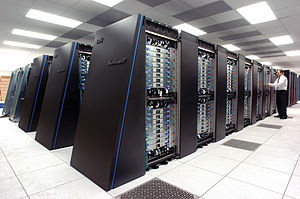Incredibly Efficient Supercomputer in Japan by 2017
- By
- November 28, 2016
 Today’s world leader, China’s Sunway TaihuLight, is highly likely to lose ground because Japan plans to create a new, super-efficient, the fastest computer in the world that will have a processing capacity of 130 petaflops (to compare with 93 petaflops of Sunway TaihuLight). It is worth mentioning that one petaflop is equal to one million billion floating-point operations per second.
Today’s world leader, China’s Sunway TaihuLight, is highly likely to lose ground because Japan plans to create a new, super-efficient, the fastest computer in the world that will have a processing capacity of 130 petaflops (to compare with 93 petaflops of Sunway TaihuLight). It is worth mentioning that one petaflop is equal to one million billion floating-point operations per second.
Japan plans to deliver a tenfold increase in computing performance for the same power consumption which will probably bring booming popularity to its supercomputer. And this grandiose event is expected to occur by 2017.
Japan’s National Institute of Advanced Industrial Science and Technology (with the abbreviation AIST) wants not only to build supercomputers that leave behind all the world’s machines. It is also aiming to the effectiveness. But how to attain a power consumption of under 3 megawatts? One can claim everything is possible if to put your shoulder to the wheel. But let’s imagine just for a minute that Japan’s current highest entry in the Top500 supercomputer list, Oakforest-PACS, delivers one-tenth the performance (13.6 petaflops) for the same power. So it becomes clear that the next aim is truly overwhelming and almost unreal.
TaihuLight consumes over 15 MW.
Another considerable objective of AIST is a power usage effectiveness (the ratio of total power consumption, including that required for cooling, to power consumed by computing devices) of under 1.1. That’s a PUE value obtained only by the world’s most powerful data centers.
AIST has its trump card – liquid cooling, a method that is also used by French company Atos in its supercomputer design for the French Alternative Energies and Atomic Energy Commission (CEA). A curious fact is that Atos is aiming for a performance one exaflop (one billion billion flops). But its computer will not be ready until 2020, while AIST expects its “child” to be born a year from now.
Other countries tend to optimize their main supercomputers for calculations such as atmospheric modeling or nuclear weapon simulations. And what is AIST doing meanwhile? It is targeting machine learning and deep learning applications in the growing field of artificial intelligence (AI) with the new computer design.
The project is called AI Bridging Cloud Infrastructure (ABCI), and is designed for use by startups, modern industrial supercomputing users and academia, in compliance with a document published by AIST.
ABCI, the fastest computer in the world, will be built at the University of Tokyo’s Kashiwa Campus, around 40 kilometers northeast of Tokyo.
- Category: other
- Tags: Japan, supercomputer, the fastest computer, the fastest computer in the world
Interesting posts
The Growing Demand for IT Certifications in the Fintech Industry
The fintech industry is experiencing an unprecedented boom, driven by the relentless pace of technological innovation and the increasing integration of financial services with digital platforms. As the lines between finance and technology blur, the need for highly skilled professionals who can navigate both worlds is greater than ever. One of the most effective ways… Read More »
CompTIA Security+ vs. CEH: Entry-Level Cybersecurity Certifications Compared
In today’s digital world, cybersecurity is no longer just a technical concern; it’s a critical business priority. With cyber threats evolving rapidly, organizations of all sizes are seeking skilled professionals to protect their digital assets. For those looking to break into the cybersecurity field, earning a certification is a great way to validate your skills… Read More »
The Evolving Role of ITIL: What’s New in ITIL 4 Managing Professional Transition Exam?
If you’ve been in the IT service management (ITSM) world for a while, you’ve probably heard of ITIL – the framework that’s been guiding IT professionals in delivering high-quality services for decades. The Information Technology Infrastructure Library (ITIL) has evolved significantly over the years, and its latest iteration, ITIL 4, marks a substantial shift in… Read More »
SASE and Zero Trust: How New Security Architectures are Shaping Cisco’s CyberOps Certification
As cybersecurity threats become increasingly sophisticated and pervasive, traditional security models are proving inadequate for today’s complex digital environments. To address these challenges, modern security frameworks such as SASE (Secure Access Service Edge) and Zero Trust are revolutionizing how organizations protect their networks and data. Recognizing the shift towards these advanced security architectures, Cisco has… Read More »
CompTIA’s CASP+ (CAS-004) Gets Tougher: What’s New in Advanced Security Practitioner Certification?
The cybersecurity landscape is constantly evolving, and with it, the certifications that validate the expertise of security professionals must adapt to address new challenges and technologies. CompTIA’s CASP+ (CompTIA Advanced Security Practitioner) certification has long been a hallmark of advanced knowledge in cybersecurity, distinguishing those who are capable of designing, implementing, and managing enterprise-level security… Read More »
Azure DevOps Engineer Expert Certification: What’s Changed in the New AZ-400 Exam Blueprint?
The cloud landscape is evolving at a breakneck pace, and with it, the certifications that validate an IT professional’s skills. One such certification is the Microsoft Certified: DevOps Engineer Expert, which is validated through the AZ-400 exam. This exam has undergone significant changes to reflect the latest trends, tools, and methodologies in the DevOps world.… Read More »

